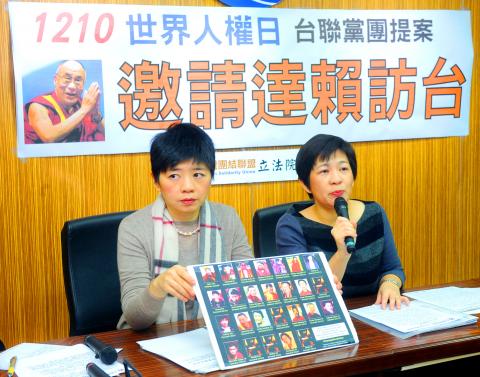|
TSU caucus to propose
inviting the Dalai Lama
RESOLUTION: The party is to propose a
legislative motion demanding the government officially condemn Beijing’s brutal
oppression of Tibetans
By Chris Wang / Staff reporter

Taiwan Solidarity Union
legislators Lin Shih-chia, left, and Huang Wen-ling announce in Taipei yesterday
that they will propose a motion in the legislature inviting the Dalai Lama to
visit Taiwan, after the government recently decided not to grant him a visa.
Photo: Wang Min-wei, Taipei Times
The Taiwan Solidarity Union (TSU)
yesterday said its caucus would put forth a proposal in the legislature today to
invite exiled Tibetan spiritual leader the Dalai Lama to visit Taiwan after the
government refused to grant him a visa last month.
President Ma Ying-jeou’s (馬英九) administration denied the Dalai Lama a visa to
speak at the Asia-Pacific regional conference of the International Federation of
Business and Professional Women, saying the timing was not “opportune.”
The refusal reflects Ma’s kowtowing to China and pro-Beijing stance while
sacrificing his previous pledge to uphold human rights, TSU Legislator Huang Wen-ling
(黃文玲) told a press conference.
Huang said her party could not turn a blind eye to the deteriorating human
rights situation in Tibet, where at least 94 Tibetans had set themselves on fire
and died over the past three years.
The proposal is to seek a legislative resolution to demand the government
officially condemn Beijing’s brutal oppression of Tibetans and establish a panel
to probe into the growing number of self-immolations, she said.
“We would also like to invite the Dalai Lama to visit Taiwan to highlight the
value the nation places on human rights,” Huang said.
Ma has ignored several issues, including human rights violations and the plight
of political prisoners in China, since taking office in 2008, TSU Legislator Lin
Shih-chia (林世嘉) said.
Taiwan should pay close attention to what is happening in China — in particular
in Tibet — because “what is happening in Tibet now could happen to Taiwan in the
future,” Lin said.
|
![]()
![]()
![]()